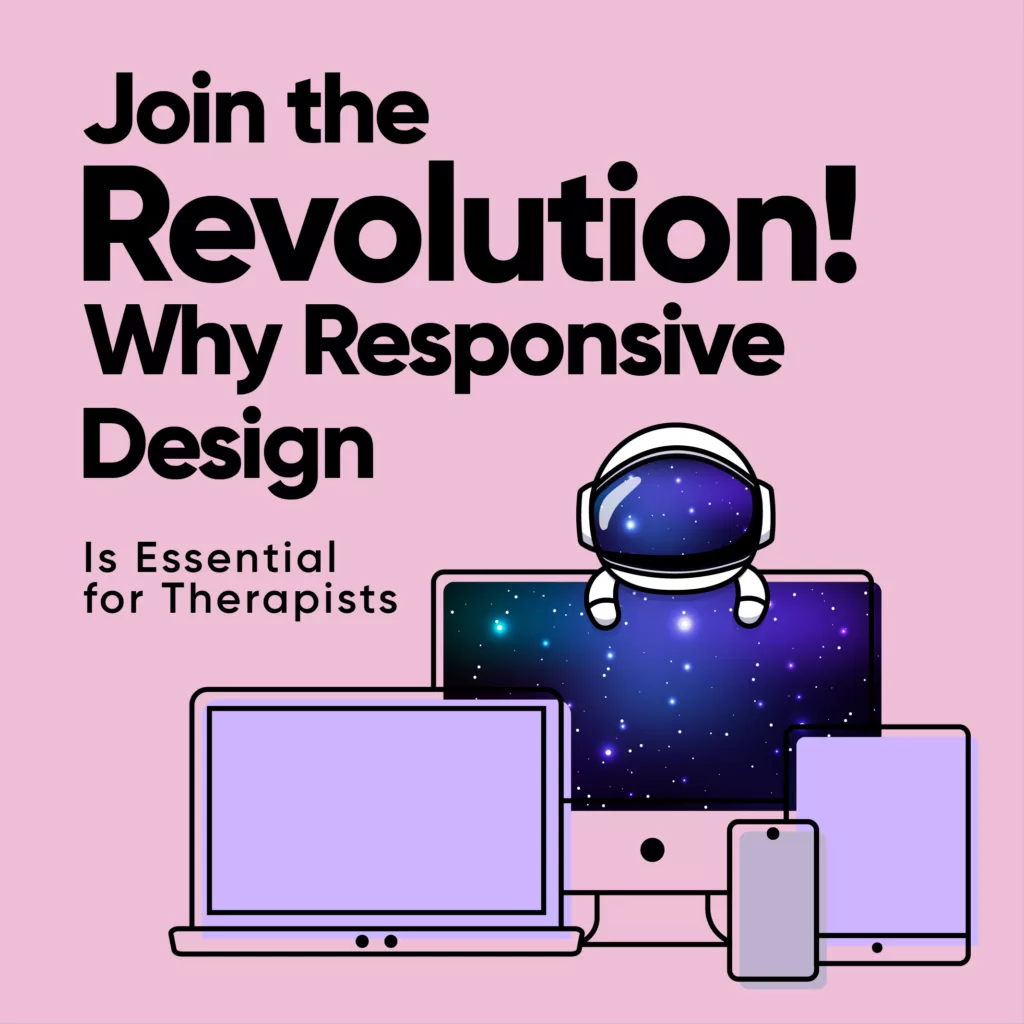Join The Revolution! Why Responsive Design Is Essential For Therapists
Responsive Website Design Service For Therapist
Do you know what sets a great therapist website apart from a good one?
It’s not just the content or the fancy graphics; it’s something more fundamental – responsive design.
If you’re a therapist looking to make a meaningful impact in today’s digital age, join the revolution and discover why responsive design is essential for therapist websites.
In this blog post, we’ll unravel the importance of responsive design for therapist websites, how it can benefit your practice, and why it’s no longer an option but a necessity in the online world.

What Is Responsive Design Anyway?
Let’s start with the basics.
Responsive design is like giving your therapist’s website a magical ability.
It makes your site adapt and look fantastic on any device – be it a computer, tablet, or smartphone.
No more frustrating pinching, zooming, or endless scrolling for your visitors. It’s all about creating a seamless, user-friendly experience.
Why Does Responsive Design Matter for Therapists?
Accessibility Matters to Everyone
Accessibility is a non-negotiable aspect when it comes to therapist websites. Your clients, as you know, come from all walks of life, and they’re accessing your website through various devices.
A responsive design ensures that your site is accessible to everyone, regardless of the device they use. This inclusivity makes a strong impression, showing that you care about your clients’ convenience.
I’ve witnessed how this simple shift in design thinking can make a significant impact. Clients have expressed appreciation for the seamless experience, emphasizing that the accessibility of the website reflects a practice that genuinely cares about their comfort and convenience.
After all, when it comes to therapy, creating a welcoming and inclusive space begins the moment someone lands on your website.
So, when you think about responsive design, think about the diverse clients you serve and the message you want to send.
It’s not just a trend; it’s a commitment to accessibility and a reflection of your dedication to providing the best possible experience for your clients.
Google Loves It
Google, the ruler of the internet kingdom, loves responsive design.
In fact, they favor responsive websites when it comes to search rankings.
Google’s algorithm, which is like its rulebook for ranking websites, takes responsive design seriously. In simpler terms, it rewards websites that are mobile-friendly with higher rankings. So, if your therapist website isn’t responsive, you might find yourself buried beneath your competitors in those all-important search results.
So, if you want your therapist website to appear higher in search results (who doesn’t?), responsive design is your ally. It’s not just a nice-to-have; it’s a must-have for any therapist website that wants to stand out in the online crowd.
Mobile Is King
More than half of all internet traffic comes from mobile devices.
Yes, you read that right, more than half!
That’s a staggering statistic.
To put it in perspective, a study from 2020 found that mobile users spend a whopping 203 minutes per day consuming media on their devices. In contrast, desktop users clock in at just 128 minutes per day. That’s a pretty big difference! And when it comes to search, mobile is king, accounting for 59% of organic search visits. These are the searches where users type something into Google and then click on a website that isn’t labeled as an ad.
This means that if your therapist website isn’t mobile-friendly, you could be missing out on connecting with a significant portion of potential clients. It’s not just about following a trend; it’s about reaching people where they are, and these days, they’re on their phones.
I’ve seen it happen – therapists who make their sites work well on phones get noticed more. When your website is easy to use on a small screen, you’re reaching a lot more people. It’s not just about following a trend; it’s about fitting into how folks get info these days.
Let’s talk about that potential, we’ll call her Lisa, is in need of therapy. She’s on her lunch break at work, and she decides to search for therapists in her area. So, she takes out her phone and starts her search. If your website isn’t responsive and mobile-friendly, Lisa might struggle to navigate it. Tiny text, weirdly formatted pages, and endless scrolling – it’s a recipe for frustration.
But if you’ve got responsive design on your side, it’s a whole different story. Lisa can effortlessly browse your website, read about your services, and even book an appointment, all from the comfort of her smartphone. It’s about meeting clients where they are, and these days, they’re on their phones.
So, when I say that mobile is king, I mean it with numbers and real-world scenarios to back it up.
It’s not a passing trend; it’s a fundamental shift in how people access information.
And if you want to capture the attention of potential clients like Lisa, responsive design is the way to go. It ensures that your therapist website is a welcoming and user-friendly space, whether someone is visiting from a computer or their trusty smartphone.
First Impressions Matter
You know, in the world of therapist websites, first impressions carry immense weight. I always stress to my clients the significance of making that initial moment count.
Now, imagine if what they see is a jumbled mess – text that’s too small to read, images overlapping, and buttons that seem impossible to tap. Not a great first impression, right?
So, you get the gist. In the world of therapist websites, those initial moments matter immensely. When your website is responsive, it sends a clear message – that you value user experience and have taken the time to create a space that’s user-friendly and inviting.
That positive first impression isn’t just about the aesthetics of your website. It sets the stage for the entire therapeutic relationship. It’s about creating an online environment that not only looks good but also reflects your commitment to providing a seamless and inviting experience for your clients.
User Experience Is Key
Let’s talk about the heart of your therapist website -the user experience.
It’s not just a fancy term – it’s the key to making a meaningful connection with potential clients.
Why does this matter?
Well, think about it this way -when visitors can effortlessly move around your site, locate the information they’re after, and easily reach out to you, it creates a seamless experience.
And you know what happens when people have a smooth, hassle-free experience?
They’re more inclined to take that next step and become your clients.
And in the world of therapist websites, where building trust and connections is so important, a positive user experience can make all the difference.
Before the next section, learn more about website creation for your practice:
- Photos for Your Therapy Website | Counseling Stock Photos
- 4 Factors to Consider When Choosing the Best Mental Health Website Design
- Choosing the Right Typography for Your Therapist Website
- 7 Ways to Hook Your Blog Readers from Start to Finish
- Creating Videos for Your Therapist Website
- How to Create A Therapist Directory Listing that Gets You Results
The Nuts and Bolts of Responsive Design
Now that you’re convinced about the importance of responsive design, let’s peek under the hood:
- Fluid Grids
Your website is like a puzzle with flexible pieces. Responsive design ensures these puzzle pieces adapt effortlessly to different screen sizes.
So, whether it’s a massive desktop screen or a tiny smartphone display, your site’s layout adjusts seamlessly. No more awkward gaps, text that’s too small, or content overlapping. It’s like having a tailor-made suit that fits perfectly every time. - Flexible Images
Have you ever visited a website on your phone only to see images taking forever to load or appearing pixelated? Responsive design tackles this issue head-on. It optimizes your images for various devices, making sure they load quickly and look crystal clear. It’s like having a photographer who adjusts the focus and lighting to make every shot picture-perfect. - Media Queries
Think of media queries as your website’s rulebook for different devices. They’re like instructions that dictate how your site should behave on screens of all sizes. These queries cover various aspects, such as font size, layout, and image dimensions. So, whether it’s a massive desktop monitor or a tablet, your website knows how to present itself correctly. It’s like having a versatile actor who knows their lines and cues for every scene. - Touch-Friendly
Responsive design doesn’t just consider the traditional mouse and keyboard setup. It takes touchscreens into account as well. Buttons, links, and navigation elements are designed to be finger-friendly, making them easy to tap and interact with on smartphones and tablets. It’s like having a user manual that’s so simple, even a child could use it.
- Therapist Websites: 8 Myths Every Therapist Should Know!
- Therapy Website Copy – Therapist Website Design
- 5 Common Mistakes to Stop Making on Your Therapist Website Immediately
- 4 Ways to Identify Goals for Your Therapy Website
- The Best Website Hosting Site for Therapists
- Therapist Websites: Custom or Template?
- Using a Therapist Directory: The Definitive Guide – Therapist Websites
- SSL – Security for Your Therapist Website
- The Benefits and Drawbacks of Counseling Website Templates: A Comprehensive Guide
- 12 Things You Should Know Before Starting a Counseling Website
- Create Therapist Website
- Professional Design For Counseling Websites
- Affordable Therapist Website Design Solutions: A Comprehensive Guide
- Create Therapist Website – Strong Roots Web Design
- 12 Things You Should Know Before Starting a Counseling Website
- Therapy Website Copy – Therapist Website Design
- Therapist Websites: 8 Myths Every Therapist Should Know!
Some Tips to Ensure Your Website is Fully Mobile Responsive
Test Across Devices – First things first, don’t assume your website looks great on mobile just because it’s fantastic on your computer. Grab various devices, test your site thoroughly, and ensure everything looks and works as intended.
Optimize Images – Big, beautiful images are fantastic, but they can slow down your mobile site. Make sure your images are the right size and won’t leave visitors drumming their fingers as they wait for things to load.
Responsive Typography – Tiny text that requires zooming in? Nope, that’s a no-go. Your text should adapt seamlessly to different screens, so visitors don’t need a magnifying glass to read what you have to say.
Touch-Friendly Buttons – Make sure your buttons and interactive bits are big enough to tap without hitting the wrong one by mistake.
Simplify Navigation – Nobody likes getting lost in a maze of menus and submenus on a small screen. Keep things simple and organized, so visitors can find what they’re looking for without going on a scavenger hunt.
Accelerated Mobile Pages (AMP) – If you’re serious about mobile speed, consider AMP. These pages load at lightning speed, making for a smoother user experience.
Mobile-First Content – When you’re creating content, think mobile-first. Craft headlines and text that are engaging and to the point. Mobile users don’t have time for lengthy prose.
Consistent Branding – Your brand should be recognizable on any device. Your logo, color scheme, and overall vibe should stay consistent, no matter how someone’s accessing your site.
User Feedback – Don’t be afraid to ask for feedback from your users. They can offer valuable insights into their mobile experience and help you spot any hiccups you might have missed.
Professional Help – If you prefer to entrust this task to professionals, think about reaching out to web designers or developers with expertise in responsive design. They have the skills to refine your website, guaranteeing it excels on mobile devices. Here at Strong Roots Web Design, we’re well-versed in the latest responsive design trends, and we’re more than capable of optimizing your site for a seamless mobile experience.
You might find these helpful:
- Affordable Therapist Website Design Solutions: A Comprehensive Guide
- Therapy Websites: Secrets to Success – Therapist Websites
- SSL – Security for Your Therapist Website
- The Best Website Hosting Site for Therapists
- 4 Ways to Identify Goals for Your Therapy Website
- 5 Common Mistakes to Stop Making on Your Therapist Website Immediately
- 4 Factors to Consider When Choosing the Best Mental Health Website Design
The Bottom Line
Responsive design is not just a trend; it’s a revolution in web design that every therapist should embrace.
It’s all about meeting your clients where they are – on their devices.
So, if you want to stay relevant, improve your search rankings, and create an excellent user experience, opting for responsive design for therapist websites is your answer.
If you’re ready to take the plunge, consider professional help to ensure your website is responsive and ready for the digital age.
Go ahead, join the revolution, and make your therapist website shine on every screen.
And if you’re looking for guidance or expert assistance in making your therapist website responsive, don’t hesitate to reach out to us at Strong Roots Web Design.
Book a free consultation call with me, and let’s discuss how we can ensure your website looks fantastic and functions flawlessly on every device.
Related Reads for SEO:
- Website Performance Optimization for Therapy Websites
- Find the Right Keywords For Blog Post | Local SEO Strategies
- Unlocking the Power of SEO Keywords for Therapists
- Do I Need An SSL Certificate For My Website – Security for Your Therapist Website
- SEO For Therapists: The Ultimate Guide
- Responsive Website Design Service For Therapists
- 3 Best Tips in SEO for Therapist Websites
- How Adding A Blog To Your Website Helps Your Therapy Business
- Secure Website Design for Mental Health Professionals
- Top 10 SEO Web Work Services for Boosting Your Website’s Visibility
- Why Help with Website Design Can Improve Your Practice
- Why Doesn’t My Website Show Up on Google Search? Common Issues and Fixes
- Top 10 SEO Web Work Services for Boosting Your Website’s Visibility
Need any of the following?
Here are some Sample Websites We’ve Created:
Check out our Portfolio for more!
Hi! I’m Sarah.
I help counselors and therapists have a bigger impact on the world through better client connection. I do this by creating beautiful visuals and strategically designed websites.


